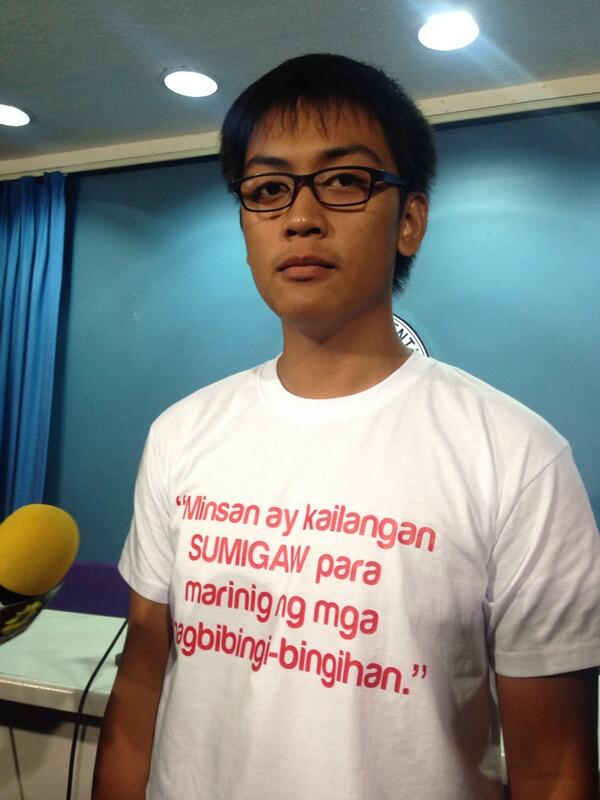Would YOU vote for Senatorial Mining Candidates like @Aksyon_Gordon , @SonnyAngara, @Cynthia_Villar, @JackEnrile ? asks Alyansa Tigil Mina
via facebook.com/no2mininginpalawan and Alyansa Tigil Mina
Alyansa Tigil Mina (ATM), an advocacy group on environmental and human rights issues, call on mid-term election candidates, including candidates for the 16th Congress, to stand against the current policy on mining.
ATM demands that genuine pro-environment candidates must carry the agenda that seek to revise the current mining policy framework. Presently, this framework is aggressively promoting liberalization of the mining industry, which results to environmental destruction and violation of human rights.
“Our natural resources and the Filipino people have long been negatively impacted by extractive industries, specifically mining, which the government continues to promote with no regards to mining-affected communities and human rights victims. In light of the upcoming mid-term elections, ATM is calling on candidates to support the passage of the Alternative Minerals Management Bill that seeks to revise the current framework of mining in the country,” said Jaybee Garganera, ATM national coordinator.
ATM declares its agenda to campaign against four (4) senatorial candidates, who are acting against the interests of the rural poor. ATM believes that, when elected, these candidates will further push for the plunder of the Philippine natural resources. These potential candidates include former senator Richard Gordon and newcomer Jack Enrile, son of politician Juan Ponce Enrile, both from UNA. Also included are new candidates Sonny Angara, and Cynthia Villar, also from political dynasties and are now running under Team PNoy.
1. Richard Gordon is an independent director of Atlas Mining Corporation. Its major subsidiary, Carmen Copper Corporation, is part of Toledo Copper Mine in Cebu. Issues include labour rights, violation of environmental laws, and potential disaster risks.
2. Cagayan Rep. Jack Enrile is part of the Enrile clan that known to be pro-mining. It was through his father’s 1996 Cagayan Economic Zone Authority (CEZA) Act that magnetite mining was encouraged and protected.
Cagayan is dubbed by critics as “Enrile Country.” A Cease-and-Desist Order has been issued against magnetite sand mining in the areas, but it remains unenforced. One ATM leader was killed last 2010 in Buguey, Cagayan, on his way home after convening a local mining forum.
3. Aurora Rep. Sonny Angara is a member of the board of directors of Aurora Pacific Ecozone and Freeport Authority (APECO) — a 12,427-hectare project in Aurora province — that covers small farmers land certificates and ancestral domains of Dumagats. This investment initiative has been termed as “legalized land grabbing.” Mining projects are part of the APECO blueprint.
4. The Villar Family owns Queensberry Mining and is directly involved in the Kingking copper-gold project in Compostella Valley in Mindanao. This mining project has been documented to have links with armed goons and will pose serious threats to lives and property once operational.
No to mining in Palawan asks “Would YOU vote for Senatorial Mining Candidates?”
Additionally, the alliance supports candidates who will assert local autonomy and right to protect the environment. ATM insists that despite the current administration’s move to address some loopholes in the mining law with the new Executive Order No. 79, s. 2012, there is still no premium given to the right of local governments and the opposition of mining-affected communities to resist large-scale mining operations in the country. This has been evident in the recent issuance of the environmental compliance certificate (ECC) for the Tampakan Copper Gold Mining Project last February despite the South Cotabato Environment Code that does not allow open pit mining.
Meanwhile, ATM is also advocating for candidates to look into and promote the legislative agenda that indigenous peoples from different parts of the country are pushing for.
Garganera added “Between 10%—12% of the country’s population is composed of indigenous communities who are marginalized. As representatives in the lower and upper house of Congress, we believe that the future legislators should bring into their consciousness the need to recognize and uphold the rights of our indigenous brother and sisters, particularly their right to self-determination.”
Mining-affected communities and member-organizations of ATM will support local and national candidates who subscribe to these principles.
Images via facebook.com/no2mininginpalawan






